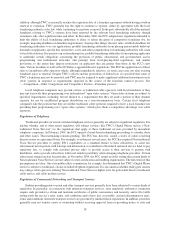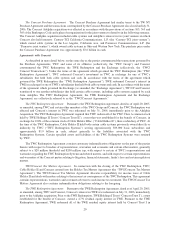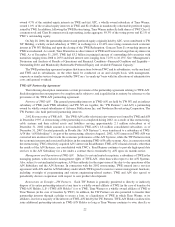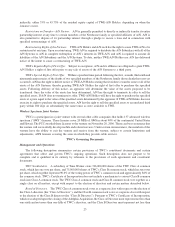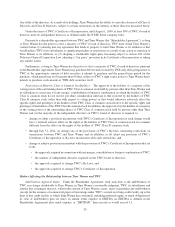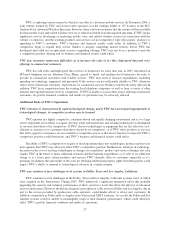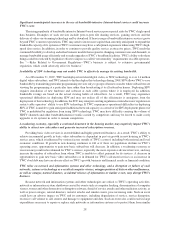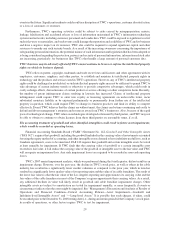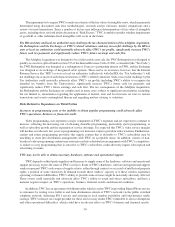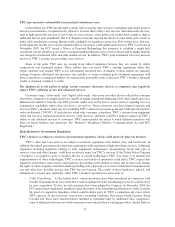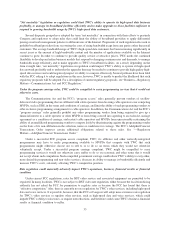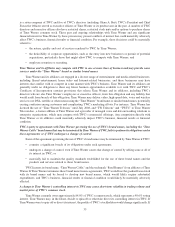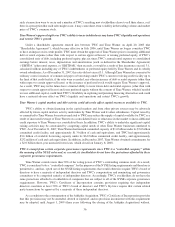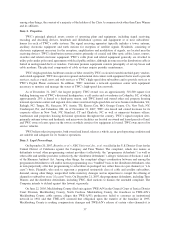Time Warner Cable 2007 Annual Report Download - page 33
Download and view the complete annual report
Please find page 33 of the 2007 Time Warner Cable annual report below. You can navigate through the pages in the report by either clicking on the pages listed below, or by using the keyword search tool below to find specific information within the annual report.Significant unanticipated increases in the use of bandwidth-intensive Internet-based services could increase
TWC’s costs.
The rising popularity of bandwidth-intensive Internet-based services poses special risks for TWC’s high-speed
data business. Examples of such services include peer-to-peer file sharing services, gaming services and the
delivery of video via streaming technology and by download. If heavy usage of bandwidth-intensive services grows
beyond TWC’s current expectations, TWC may need to invest more capital than currently anticipated to expand the
bandwidth capacity of its systems or TWC’s customers may have a suboptimal experience when using TWC’s high-
speed data service. In addition, in order to continue to provide quality service at attractive prices, TWC needs the
continued flexibility to develop and refine business models that respond to changing consumer uses and demands, to
manage bandwidth usage efficiently and to make upgrades to TWC’s broadband facilities. TWC’s ability to do these
things could be restricted by legislative efforts to impose so-called “net neutrality” requirements on cable operators.
See “—Risks Related to Government Regulation—TWC’s business is subject to extensive governmental
regulation, which could adversely affect its business.”
Availability of SDV technology may not enable TWC to effectively manage its existing bandwidth.
As of December 31, 2007, TWC had deployed switched digital video, or SDV, technology to over 1.4 million
digital video subscribers, and TWC intends to further deploy this technology during 2008. SDVallows TWC to save
bandwidth by transmitting particular programming services only to groups of homes or nodes where subscribers are
viewing the programming at a particular time rather than broadcasting it to all subscriber homes. Deploying SDV
requires installation of new hardware and software at each cable system where it is employed. In addition,
bandwidth savings are based on the actual viewing habits of subscribers. As a result, TWC may experience
operational difficulties in deploying SDV and may not realize all of the efficiencies it anticipates from the
deployment of this technology. In addition, the FCC may interpret existing regulation or introduce new regulation to
restrict cable operators’ ability to use SDV technology. If TWC experiences operational difficulties in deploying
SDV, if TWC is unable to gain anticipated additional network capacity as a result of its SDV deployment plans or if
TWC is prohibited by regulation from using SDV technology, TWC may have difficulty carrying the volume of
HDTV channels and other bandwidth-intensive traffic carried by competitors and may be forced to make costly
upgrades to its systems in order to remain competitive.
A weakening economy, especially a continued downturn in the housing market, may negatively impact TWC’s
ability to attract new subscribers and generate increased subscription revenues.
Providing basic video services is an established and highly penetrated business. As a result, TWC’s ability to
achieve incremental growth in basic video subscribers is dependent in part on growth in new housing in TWC’s
service areas, which is influenced by various factors outside of TWC’s control, including both national and local
economic conditions. If growth in new housing continues to fall or if there are population declines in TWC’s
operating areas, opportunities to gain new basic subscribers will decrease. In addition, a weakening economy or
recession may result in less demand for TWC’s services, especially the more expensive advanced services, and may
increase the number of subscribers from whom TWC is unable to collect payment for its services. A decrease in
opportunities to gain new basic video subscribers or in demand for TWC’s advanced services or an increase in
TWC’s bad debt may have an adverse effect on TWC’s growth, business and financial results or financial condition.
TWC relies on network and information systems and other technology, and a disruption or failure of such
networks, systems or technology as a result of computer viruses, misappropriation of data or other malfeasance,
as well as outages, natural disasters, accidental releases of information or similar events, may disrupt TWC’s
business.
Because network and information systems and other technologies are critical to TWC’s operating activities,
network or information system shutdowns caused by events such as computer hacking, dissemination of computer
viruses, worms and other destructive or disruptive software, denial of service attacks and other malicious activity, as
well as power outages, natural disasters, terrorist attacks and similar events, pose increasing risks. Such an event
could have an adverse impact on TWC and its customers, including degradation of service, service disruption,
excessive call volume to call centers and damage to equipment and data. Such an event also could result in large
expenditures necessary to repair or replace such networks or information systems or to protect them from similar
28


